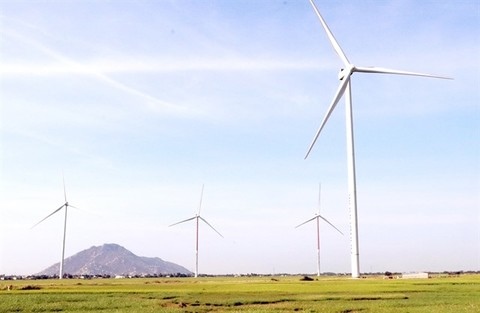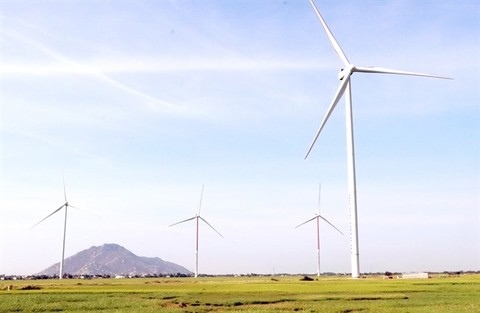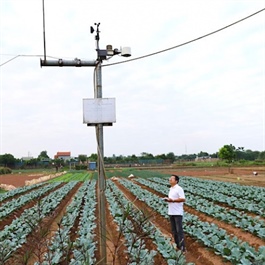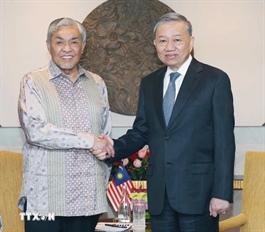Huge potential for VN, UK to boost cooperation in clean energy
Huge potential for VN, UK to boost cooperation in clean energy
There is a huge potential for Việt Nam and the UK to enhance cooperation in clean energy, as both countries have set ambitious goals for carbon neutrality moving towards a sustainable future, experts have said.

A wind farm in Ninh Thuận Province. There are a huge potential for Việt Nam and the UK to enhance cooperation in clean energy as both countries have set ambitious goals for carbon neutrality moving towards a sustainable future. — VNA/VNS Photo Công Thử |
At the 29th Conference of the Parties to the UN Framework Convention on Climate Change (COP29) taking place in Baku, Azerbaijan from November 11 to 22, British Prime Minister Keir Starmer announced a new climate target: to reduce the country’s emissions by 81 per cent against 1990 levels by 2035, an update from the previous Conservative government's 78 per cent goal.
The UK’s Labour party came to power over the summer with a bold agenda to cut bills, create jobs and deliver security with cheaper, zero-carbon electricity by 2030 to help make Britain a clean energy superpower.
To achieve this mission, the UK aims to quadruple offshore wind to a target of 55GW by 2030 and more than triple solar power to 50GW. It also aims to at least double its onshore wind capacity to 35GW, build new nuclear projects and invest in carbon capture and storage.
According to the UK National Energy System Operator (NESO), clean power is a huge challenge, but it is achievable for the UK by 2030. “It will involve an investment programme averaging £40 billion (US$50.5 billion) or more annually, which, with the right policy mix, can be delivered without increasing costs for consumers, without compromising security of supply, and while bringing local economic and job opportunities,” NESO’s report stated.
As for Việt Nam, at COP26 in 2021 Prime Minister Phạm Minh Chính announced the country’s commitments to phase out coal power generation and achieve net zero carbon emissions by 2050. Although this is considered an ambitious goal for Việt Nam, the country is actively leading the decarbonisation effort in the Asia-Pacific region, with an impressive deployment of renewable energy in recent years.
Việt Nam included the net zero target in its National Climate Change Strategy, which was approved in July 2022.
The country also issued the National Strategy on Green Growth for the 2021-2030 period in October 2021 and a national action plan in July 2022.
Notably, Việt Nam signed the Just Energy Transition Partnership (JETP) with the UK and other nations to raise $15.5 billion to further support its net zero 2050 goal with a focus on transition away from coal.
In the eighth national power development plan (PDP8) approved on April 1, Việt Nam aims for renewable energy to comprise 48 per cent of the country’s energy mix by 2030 and up to 71 per cent by 2050.
According to an insight from PWC, PDP8 presents an ambitious shift for Việt Nam’s energy mix away from coal and heavily weighted towards renewables and new technologies, underpinning the Government’s international commitments to reach net zero by 2050.
The World Bank estimated in 2022 that Việt Nam may need an additional investment of about $368 billion by 2040, equivalent to 6.8 per cent of GDP per year, to achieve its net zero target.
Việt Nam and the UK are among more than 100 economies, or about 80 per cent of the world’s greenhouse gas emitters, that have pledged to reach net zero, statistics from Climate Watch revealed.
Ample room for cooperation
According to the Department of Climate Change under the Ministry of Natural Resources and Environment, it is necessary for Việt Nam to enhance international cooperation on the pathway towards net zero. Achieving the target will require vast resources in terms of finance, infrastructure and labour in the context that domestic resources remain limited.
Vũ Việt Thành from the European - American Markets Department under the Ministry of Industry and Trade said that Việt Nam needs to closely watch the UK government's implementation of its commitment to net zero.
The new UK government has set an ambitious goal to become a clean energy superpower by 2030, Thành said.
“The ambition has opened significant space for cooperation between Viêt Nam and the UK in renewable energy development,” he said, adding that the Ministry of Industry and Trade is actively working with the UK to raise resources for the enforcement of JETP.

Workers of Việt Nam Electricity check the transmission system in Lâm Đồng Province. The UK – Việt Nam Free Trade Agreement is creating favourable environment for the investments of British companies in energy sector in Việt Nam. — VNA/VNS Photo Huy Hùng |
With the UK - Việt Nam Free Trade Agreement (UKVFTA) and the UK’s forthcoming accession to the Comprehensive and Progressive Agreement for Trans-Pacific Partnership (CPTPP) expected in December, there is a significant potential to promote bilateral cooperation in renewable energy, including offshore wind power, energy storage, smart grid and high-quality workforce training.
British Consul General in HCM City Alexandra Smith said that the UK government has always been a partner of Việt Nam in its energy transition.
She spoke at a workshop about UK experience with the renewable energy supply chain held in late October, during a visit from a green energy trade mission including 17 British enterprises in offshore wind, green hydrogen and energy storage.
According to UK Deputy Trade Commissioner for Southeast Asia Rhiannon Harries, climate change is a global challenge that requires global solutions and global partnerships.
Việt Nam has set a clear goal to accelerate its transition to renewable energy, which has been outlined in PDP8. “The UK is well placed to support Việt Nam’s clean energy ambitions,” she said.
Also in late October, Việt Nam's Ministry of Natural Resources and Environment and the UK's Foreign, Commonwealth and Development Office signed a memorandum of understanding on environment and climate, which is expected to contribute to the global net zero goal.
British enterprises are also showing interest in renewable energy projects in Việt Nam, particularly offshore wind energy.
According to the British Chamber of Commerce in Việt Nam (Britcham), the UK private sector stands ready to contribute significantly to energy development in Việt Nam. Britcham pointed out that the PDP8 showcases Việt Nam’s strong commitment to decarbonisation. It also recommended a swift implementation of PDP8 in relation to the development of LNG, solar and wind, along with the development of laws and regulations to enable this implementation.
The coordinated implementation of JETP with PDP8 is also critical to ensure the readiness of specific pilot projects, particularly in offshore wind energy, Britcham wrote in a position paper at the Việt Nam Business Forum earlier this year.
Britcham at a meeting with the Ministry of Industry and Trade in June also called for efforts to accelerate the investments of British energy groups such as BP, Enterprise Energy and Mainstream Renewable Energy in Việt Nam.
The UK has invested in 584 projects in Việt Nam worth $4.5 billionas of the end of September.























